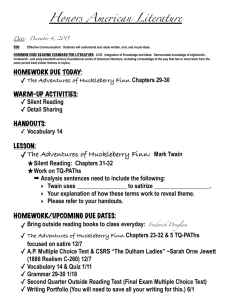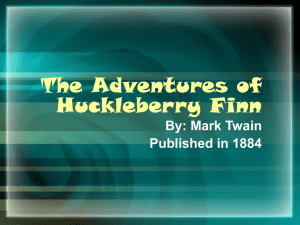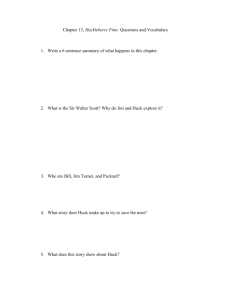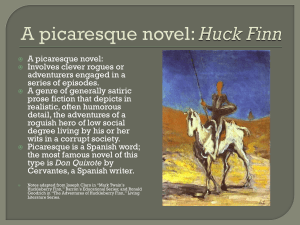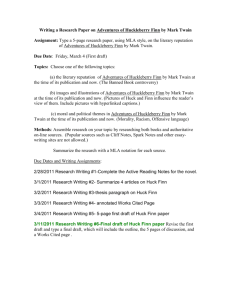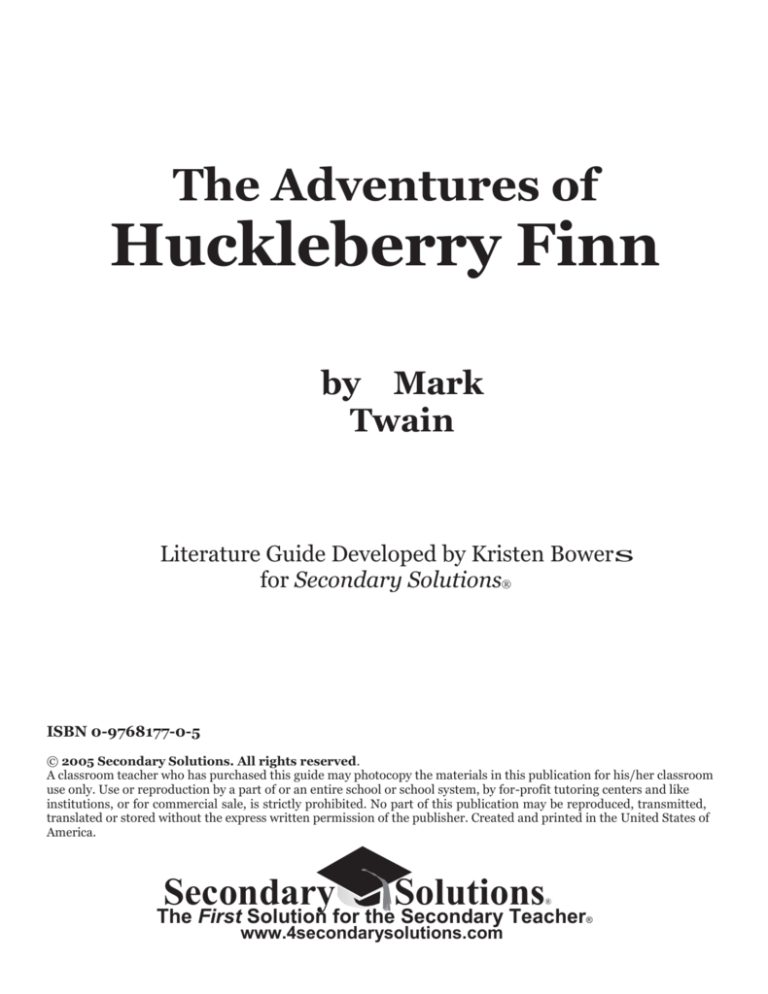
The Adventures of
Huckleberry Finn
by Mark
Twain
Literature Guide Developed by Kristen Bowers
for Secondary Solutions®
ISBN 0-9768177-0-5
© 2005 Secondary Solutions. All rights reserved.
A classroom teacher who has purchased this guide may photocopy the materials in this publication for his/her classroom
use only. Use or reproduction by a part of or an entire school or school system, by for-profit tutoring centers and like
institutions, or for commercial sale, is strictly prohibited. No part of this publication may be reproduced, transmitted,
translated or stored without the express written permission of the publisher. Created and printed in the United States of
America.
Secondary
Solutions
The First Solution for the Secondary Teacher
®
www.4secondarysolutions.com
©2005 Secondary Solutions
®
The Adventures of Huckleberry Finn
Name
Period
The Adventures of Huckleberry Finn
Anticipation/Reaction Guide
Directions: Before reading the novel, write “yes” if you agree with the statement, “no” if you
disagree with the statement, and “?” if you don’t have a strong opinion about the statement.
Yes = I agree
Pre-Reading
No = I disagree
? = I don’t know
Statement
Post-Reading
1) The “n-word” is inappropriate and racist and
should never be used.
2) Most human beings always strive to do the
“right thing.”
3) To be needed by another person is important.
4) Having dreams for the future is a necessary
part of life and helps us to fulfill our goals.
5) Books should never be banned from school
libraries or from school’s reading lists.
6) People of different ages or races can
never be true friends.
7) It is always better for children to live with
and be raised by their own parents rather
than anyone else.
8) Freedom means different things to
different people.
9) It is more important to be a part of the “group”
than to be an individual.
Directions: After completing the “Before Reading” column, get into small groups. Each group
should then make a chart like the one below, numbering from 1-9. Tally the number of “yes”, “no”
and “?” responses for each question. Once you have collected your data, discuss those issues about
which your group was divided. Make your case for your opinions, and pay attention to your
classmates’ arguments. When you have finished, answer the questions on the next page on your
own.
Statement
Yes
No
I Don’t Know
#1
#2
*Once you have completed the chart and answered the questions on the following page,
your teacher will collect your responses and keep them until you finish
reading the novel.*
Name
Period
Author Biography: Mark Twain
Samuel Langhorne Clemens, who wrote under the pen name of Mark
Twain, was born in Florida, Missouri on November 30, 1835. He was the
son of lawyer John Marshall Clemens and Jane (Langdon) Clemens, and
had three surviving siblings: Orion, Pamela and younger brother Henry.
In 1839, John Clemens moved his family to Hannibal, Missouri—the town
in which Samuel would spend much of his early life.
Clemens’s schooling was brief; he quit at the age of 12 after his father
died and Samuel was needed to help sustain the household. He
apprenticed as a printer until 1850, when his brother Orion bought a
small newspaper company in Hannibal. Samuel worked beside his brother
out of the Clemens home, and it was through working on this newspaper
that Samuel began to sharpen his craft as a writer.
Later, after a brief stay in New York and Philadelphia, Clemens decided he wanted to go to Brazil, and set
out for New Orleans to catch a South-American bound steamship. Clemens quickly got a taste for life on
the Mississippi, decided to become a steamboat pilot, and decided to pick up a new trade. Clemens
worked as a pilot for 3 years, learning everything he could about the Mississippi River and steamboat
piloting.
Then, in 1861, the Civil War broke out and Clemens found his loyalties with the South. He returned to
Hannibal and enlisted as a soldier, and was quickly promoted to the rank of Lieutenant. However, his stint
as a soldier was short. Clemens resigned at the end of two rough weeks, and joined his brother Orion who
was a Union abolitionist working under President Lincoln, and ironically, fighting against the South.
Clemens eventually moved to San Francisco, where he earned his living writing for several newspapers. It
was at this time that Clemens wrote The Celebrated Jumping Frog of Calaveras County and Other Sketches,
which was published in the Saturday Press in 1865. It was after spending several years traveling as a
speaker and writer that Clemens first saw a photo of the woman who would become his wife, Olivia (Livy)
Langdon.
Samuel and Olivia were married on February 2, 1869, and almost immediately after, he received a royalty
check for his first book, a collection of popular political and social letters called The Innocents Abroad.
However, the first few years of marriage were devastating after sickness, death and other troubles
darkened their lives. Their first child, Langdon, died at the age of two in 1872, the same year Samuel
published Roughing It. In 1872 daughter Susan was born, and Samuel continued to travel, often taking his
family with him. Their second daughter, Clara, was born in 1874, and their third, Jean, was born in 1880.
As Samuel settled into family life in Hartford, Connecticut, he began his most prolific time as a writer. He
wrote The Adventures of Tom Sawyer in 1876, Life on the Mississippi in 1883, and The Adventures of
Huckleberry Finn in 1885. In 1884, Clemens founded his own publishing company, Charles L. Webster &
Company. The company was successful for over ten years, but after several financial setbacks, the
company declared bankruptcy in 1894.
In order for his family to stave off personal bankruptcy, Clemens moved the family to Europe. He was
eventually able to pay his debts by conducting an international reading tour. In 1896, the Clemens family
was dealt yet another blow, however, with the death their oldest daughter. In 1900, they settled again in
New York, their debts finally paid in full. After Livy became ill, Clemens moved his family to warmer
weather under doctor’s orders. Olivia died in Florence, Italy in 1904.
In 1907, Clemens received an honorary degree from Oxford University. His daughter Jean died in 1909,
and her death seriously affected his health. Clemens died of heart failure on April 21, 1910 in
Redding, Connecticut, and was buried in Elmira, New York.
Name
Period
Standards Focus: Exploring Expository Writing
Directions: Using complete sentences, answer the following questions based upon the article
“Author Biography: Mark Twain.”
1. How old was Mark Twain when he died?
2. What is Mark Twain’s real name?
3. In what city did Clemens spend his younger years?
4. How many children did Clemens have? What were their names?
5. What business venture of Clemens’s failed?
6. What book did Clemens write just before he wrote The Adventures of Huckleberry Finn?
7. What two questions would you ask in an interview with Mark Twain?
8. It can be said that Mark Twain suffered many hardships and setbacks in his life. What facts
from the article support this theory?
9. Using the information from this article, on a separate sheet of paper, draw a timeline of the
important events in Mark Twain’s life. Be sure to include dates for each event.
Name
Period
Huckleberry Finn Vocabulary List
The chapter in which the vocabulary word is found is in parenthesis.
1. abolitionist- a person against slavery (8)
2. addled- confused (37)
3. afflicted- handicapped, troubled by (25)
4. brash- uninhibited, quick to act or speak without thought (8)
5. cavorting- behaving extravagantly; “horsing around” (18)
6. coaxing- persuading persistently (36)
7. counterfeit- fake, not real (4)
8. disposition- inclination; temperament (17)
9. evade- to escape or avoid by cleverness or deceit (39)
10. faculties- any of the power or capacities possessed by the human mind (41)
11. frock- a woman’s dress (39)
12. huffy- in a fit of anger or annoyance (19)
13. impudent- bold, rude (33)
14. insurrection- the act or incidence of open revolt (37)
15. mortification- humiliation (32)
16. mournful- sad (1)
17. pensive- thoughtful (17)
18. ransacked- searched thoroughly, often making a mess (like in a burglary) (18)
19. rummaging- searching, browsing through (12)
20.sanctified- holy (25)
21. shroud- cloth used to wrap a body, usually for burial (27)
22. spite- to anger or annoy (6)
23. sublime- excellent, having a sense of grandeur (21)
24. sultry- very humid and hot (42)
25. tedious- tiresome by reason of length; boring (38)
26. unfurled- spread something out (40)
27. victuals- food (1)
Name
Period
Standards Focus: Jargon and Slang
Chapters 4-7
Ever heard of gnarly, radical, awesome, tubular, gag me with a spoon, moded, or grody to the max? These
are expressions of slang, fleeting expressions of pop culture that began in California’s San Fernando Valley,
but eventually moved into mainstream language in the 1980s. Similar to slang, jargon is a specific set of
words used by a certain profession or specialized group. Dialect is the distinctive speech pattern of a
particular region, class, or race. Unlike slang or jargon, dialect has a distinct system of grammar, vocabulary
and pronunciation, and has usually been in existence for a long time.
Huck Finn, Jim, Tom and Pap all have their own slang and jargon, within some form of a Southern dialect. For
example, Huck “don’t take no stock in mathematics,” meaning, he doesn’t think math is important or
necessary. By using such dialect and slang, Twain gives his characters a believable personality and contributes
to the realism of the setting.
Directions: Below are sentences containing words used by the characters in Huck Finn. Rewrite each
underlined word or phrase using a more updated or everyday expression that has the same meaning.
1. Huck says that when he got uncommon tired he would play hookey.
2. Judge Thatcher couldn’t seem to make it out that Huck didn’t want his money.
3. Pap says, “You’ve put on considerable many frills since I been away. I’ll take you down a peg
before I get done with you.”
4. Pap says, “Looky here—mind how you talk to me; I’m a-standing about all I can stand now—so don’t
gimme no sass.”
5. Pap went to Judge Thatcher’s house and bullyragged him for the money.
6. Every time Pap got drunk he would raise Cain around town.
7. “By and by Pap got too handy with his hick’ry, and I couldn’t stand it.”
8. “While we laid off after breakfast to sleep up, both of us being about worn out, I got to
thinking…”
9. “Another time a man comes a-prowling round here, you roust me out, you hear?”
10. “I took a good gap and a stretch, and was just going to unhitch when I heard a sound away over the
water.”
11. “It was kind of lazy and jolly, laying off comfortable all day, smoking and fishing, and no books
to study.”
12. “Pap warn’t in a good humor--so he was his natural self.”
Name
Period
Vocabulary Building: Acrostic
Chapters 4-7
Directions: Match each vocabulary word in the box to the correct definition. Print your
answer, one letter to a space, on the lines provided. When you have finished, unscramble the
letters in the circles to supply the bonus phrase.
counterfeit
sanctified
impudent
sultry
mournful
tedious
victuals
brash
abolitionist
ransacked
1. humid and hot
2. uninhibited
3. sad
4. tiresome
5. food
6. person against slavery
7. holy
8. bold, rude
9. hastily searched
10. fake
Bonus Phrase
The name of the wrecked boat:
W
Hint: Look ahead to Chapter 13!
©2005 Secondary Solutions
15
The Adventures of Huckleberry Finn
Name
Period
Standards Focus: Setting
Chapters 8-11
One of the most important aspects of a novel is its setting. Setting includes:
physical description: geography, weather, description of surroundings, etc.
time: historical time period, season, time of day, etc.
atmosphere: social, cultural and political conditions
In Huckleberry Finn, Huck, and Jim’s adventures take place along the Mississippi River. The fact that Twain
also spent a significant amount of time on the Mississippi helps to create an even more realistic setting for the
novel.
Directions: For each section, find specific examples from Chapters 8-11 that describe the setting.
Physical Description: Geography, Weather, etc.
“There was freckled places on the ground where the light sifted down through the leaves, and the
freckled places swapped about a little, showing there was a little breeze up there.”
Time: Time Period, Season, Time of Year, Day, etc.
Atmosphere: Social, Cultural and Political Climate
©2005 Secondary Solutions
16
The Adventures of Huckleberry Finn
Name
Period
Standards Focus: Narrator and Point of View
Chapters 12-15
The narrator is the person who relates the events of a story to a reader or audience. Point of view is the
perspective from which a story is told. The point of view from which a story is told determines how the
reader interprets the story and understands the characters. There are three main types of point of view:
First Person: narrator is a character in the story; uses the first person “I” to tell the story
Third Person Limited: narrator does not participate in the action of the story; relates the thoughts
and feelings of only one character
Third Person Omniscient: narrator does not participate in the action of the story; relates the
thoughts and feelings of all the characters
The Adventures of Huckleberry Finn is told from the first person point of view. The story is told by
Huck Finn, and he uses the first person pronouns “I”, “me” and “my.”
Directions: Answer the following questions using complete sentences.
1. Do you think the novel would be as effective or entertaining if another narrator told the story,
rather than Huck Finn from the first person point of view? Explain your answer.
2. What if Tom Sawyer was telling the story? Knowing Tom’s character and tendency to tell white
lies and exaggerate, how would the story be different?
3. How would the story be different if Miss Watson told the story? What details might be added?
What might be left out?
4. Using your literature textbook, find another story or novel that has been written in first person
point of view. How would that story be different if told by a different character or an outside
observer?
5. On a separate piece of paper, rewrite the first paragraph of Chapters 12 and 15, changing the first
person point of view into the third person omniscient point of view.
©2005 Secondary Solutions
17
The Adventures of Huckleberry Finn
Name
Period
Vocabulary Building: Context Clues
Chapters 12-15
Directions: Choose a word from the vocabulary list in the box to correctly complete each
sentence. Write the correct word in the blank.
addled
faculties
mortification
afflicted
frock
pensive
cavorting
huffy
shroud
disposition
insurrection
sublime
1.
Huck enjoyed doing things his father didn’t like, merely to
2.
In order to hide from the slave hunters, Jim had to
evade
spite
unfurled
him.
himself in the
clothing they found on the wrecked boat.
3.
Huck dressed in a girl’s
and called himself Sarah Mary Williams.
4.
Huck lied and said that his father was hiding from the slave hunters because he was
with smallpox.
5.
Jim and Huck traveled at night in order to
6.
Huck was
any trouble.
about the idea of reading the Bible. He could never understand the
fascination with studying dead men.
7.
As the story
, Huck learned about the Shepherdson and Grangerford
feud that had been going on for many years.
8.
Huck never seems to suffer the usual
that most preteens or teens feel
when they are embarrassed.
9.
After Huck had been shot at, he checked to see if all his
were still in
proper working order.
10. Miss Watson always got
and offended when Huck would argue against
her ideas and beliefs.
11. The duke and the king felt that by
around like a real duke and king,
everyone would easily fall for their trickery.
12. Had Huck continued living with the Widow and Miss Watson, he may have finally staged a/an
in protest of their restrictive rules.
13. The duke felt that Shakespeare’s works were “
14. Huck’s calm
.”
and ability to tell a lie kept him and Jim out of numerous
predicaments.
15. Before Huck went and apologized to Jim for fooling him, Huck was unusually introspective and
.
©2005 Secondary Solutions
18
The Adventures of Huckleberry Finn
Name
Period
Standards Focus: Tone
Chapters 16-20
In literature, tone is the author’s attitude, or how the author feels about the subject of the work. The
words and sentence structure of a piece of literature can reveal an overall feeling in the writing. Tone
can be formal, informal, humorous, serious, cynical or sentimental.
To find the tone when reading a work of literature, ask yourself:
What words reveal a certain mood or feeling?
Why might the author choose those particular words?
Does it tell you anything about the author’s background or history?
Is the author trying to call attention to a problem in society?
Why might the author write about this subject?
Directions
Read the following passages from Chapter 16 and Chapter 19. Then answer the questions that
follow.
Passage 1: from Chapter 16
“Jim said it made him all over trembly and feverish to be so close to freedom. Well, I can tell you it made me all
over and trembly and feverish, too, to hear him, because I begun to get it through my head that he was most
free—and who was to blame for it? Why, me. I couldn’t get that out of my conscience, no how nor no way…I
tried to make out to myself that I warn’t to blame, because I didn’t run Jim off from his rightful owner; but it
warn’t no use, conscience up and says, every time, ‘But you knowed he was running for his freedom, and you
could a paddled ashore and told somebody.’ That was so—I couldn’t get around that, noway. That was where it
pinched.”
1. What were Twain’s views of slavery? How did he show his feelings through the character of Huck
Finn?
2. Why do you think Twain wrote that Huck struggled with the idea of slavery, rather than having
Huck take a firm side on the subject?
3. What mood or feeling do you get when reading this passage? Is it humorous, serious, formal,
informal, cynical or sentimental? Which words in the passage contribute to the creation of this
mood?
©2005 Secondary Solutions
19
The Adventures of Huckleberry Finn
Passage 2: from Chapter 19
“It didn’t take me long to make up my mind that these liars warn’t no kings or dukes, at all, but just
low-down humbugs and frauds. But I never said nothing, never let on; kept it to myself; it’s the best
way; then you don’t have no quarrels, and don’t get into no trouble. If I ever learnt nothing else out of
pap, I learnt that the best way to get along with his kind of people is to let them have their own way.”
1. How do you think Twain (through Huck’s narration) feels about these men pretending to be
something they are not?
2. Why do you think Huck saw through these characters’ façade, and didn’t fall for their act, like other
children might?
3. What words in this passage sound old-fashioned? How educated is Huck? What does this tell you
about the time period in which the author lived?
4. Should Twain’s words be updated for modern readers? Does the choice of language better establish
the setting and ultimately, the overall understanding of the novel, or does it hinder your
understanding of the story?
©2005 Secondary Solutions
25
The Adventures of Huckleberry Finn
Name
Period
Comprehension Check: Cause and Effect Relationships
Chapters 21-25
Directions: Match each action or decision (effect) with the reason it occurred (cause). Each
answer may be used only once.
Effect
1. Boggs set out to kill Colonel Sherburn
2. Colonel Sherburn killed Boggs
3. The “mob” ran away from Sherburn’s house
4. The second show was packed full of men
5. The duke and king had to cut out of town
6. Jim cried for his daughter and wife
7. The king pretended he was Peter Wilks’s brother
8. The duke pretended he was deaf and dumb
9. The rapscallions’ plan was almost destroyed
Cause
a. because the king learned that the Wilks family has money
b. because the doctor knew they were frauds and liars
c. because they would have been attacked with rotten food, etc. had they put on their last show
d. because he felt he was swindled by him
e. because he needed to play the part of the Wilks’ uncle William
f.
because he had never been away from them before, and he felt guilty
g. because Sherburn called them cowards and stood his ground
h. because the sign enticed them with “women and children not allowed”
i.
because Boggs threatened to kill him first
©2005 Secondary Solutions
26
The Adventures of Huckleberry Finn
Name
Period
Standards Focus: Recognizing Vivid Details
Chapters 21-25
Directions: Read the following paragraphs from Chapter 21, then answer the questions that follow.
“On the river-front some of the houses was sticking out over the bank, and they was bowed and bent, and about ready to
tumble in. The people had moved out of them. The bank was caved away under one corner of some others, and that
corner was hanging over. People lived in them yet, but it was dangersome, because sometimes a strip of land was wide as
a house caves in at a time. Sometimes a belt of land a quarter of a mile deep will start in and cave along and cave along till
it all caves into the river in one summer. Such a town as that has to be always moving back, and back, because the river’s
always gnawing at it.”
1.
To what sense is Twain appealing in this paragraph?
a. taste
c. sight
b. touch
d. sound
2. How is the information in this paragraph organized?
a. order of importance (most to least or least to most important)
b. chronological order (the order in which the events occurred)
c. spatial order (description of the space or surroundings)
d. order of sensory description (description of what you see, hear, taste, smell, etc.)
3. What mood pervades most of the paragraph?
a. delight
c. fear
b. mortification d. despair
4. Which of the following can you infer from the information given in the paragraph?
a. Huck and Jim are lost
c. the town’s name is Cairo
b. the people in the town are probably poor
d. Huck is scared and wants to leave
5.
Why do you think Twain included this paragraph in the novel?
“I looked over there to see who said it, and it was that Colonel Sherburn. He was standing perfectly still in the street, and
had a pistol raised in his right hand -- not aiming it, but holding it out with the barrel tilted up towards the sky. The same
second I see a young girl coming on the run, and two men with her. Boggs and the men turned round to see who called
him, and when they see the pistol the men jumped to one side, and the pistol-barrel come down slow and steady to a level
-- both barrels cocked. Boggs throws up both of his hands and says, "O Lord, don't shoot!" Bang! goes the first shot, and he
staggers back, clawing at the air -- bang! goes the second one, and he tumbles backwards on to the ground, heavy and
solid, with his arms spread out. That young girl screamed out and comes rushing, and down she throws herself on her
father, crying, and saying, "Oh, he's killed him, he's killed him!" The crowd closed up around them, and shouldered and
jammed one another, with their necks stretched, trying to see, and people on the inside trying to shove them back and
shouting, "Back, back! give him air, give him air!"
1.
What senses are used to define the setting in the passage above?
a. smell and sound
c. taste and sound
b. sight and sound
d. sight and smell
2. How would you describe the mood of the scene?
a. sullen
c. festive
b. romantic
d. tense
3. How is the information in this paragraph organized?
a. order of importance
c. chronological order
b. spatial order
d. order of sensory detail
4. How does this paragraph reflect the time period in which it was written?
©2005 Secondary Solutions
27
The Adventures of Huckleberry Finn
Name
Period
Standards Focus: Character Types
Chapters 26-31
As authors develop their characters though the use of characterization, several character types
emerge:
The protagonist of a story is the main character that changes throughout the story.
The antagonist is the main character in opposition of the protagonist; the antagonist
usually causes the protagonist’s problems. The antagonist can also be a force of nature.
Round characters are complicated and fully developed.
Flat characters are simple and uninteresting.
Dynamic characters are those that grow or change emotionally or learn a lesson.
Static characters never change or grow in the story.
Directions: For the following characters, label each character as protagonist, antagonist or
neither; round or flat; dynamic or static. For example, Huck Finn is the protagonist, who is also
round and dynamic. As you label these characters, keep in mind that we are seeing these
characters from Huck’s point of view!
1.
Jim:
2.
Tom Sawyer:
3.
Miss Watson:
4.
Widow Douglas:
5.
Pap:
6.
the king:
7.
Mary Jane:
8.
Peter Wilks:
9.
Dr. Robinson:
10. the duke:
©2005 Secondary Solutions
28
The Adventures of Huckleberry Finn
Name
Period
Standards Focus: Mapping
Chapters 32-38
Directions: Put each of the following events in chronological order, from 1- 8. Then, use the
numbers to plot the event in the correct location on the map.
Pap hides Huck in his cabin in the woods
Huck and Jim meet at Jackson’s Island
A heavy fog separates Huck and Jim
Grangerford/Shepherdson Feud
Huck and Jim see the floating house
Peter Wilks’s funeral
Huck spots the Walter Scott
The Royal Nonesuch performances
St. Petersburg
Illinois
Cairo
Missouri
Kentucky
Tennessee
Arka nsas
Alabama
Louisiana
©2005 Secondary Solutions
Mississippi
29
The Adventures of Huckleberry Finn
Standards Focus: Theme
Chapters 39-43
Theme is the central idea or message in a work of literature. The theme of a piece of literature
should not be confused with the subject of the work, but rather, is a general statement about life
or human nature. Most themes are not completely obvious and must be inferred by the reader.
A reader must take a good look at all of the elements of the novel—the character, the plot, the
setting, mood—even the title, which all work together to express the themes of a piece of work.
Directions: For each example below, think about the characters, plot, setting and mood of
the novel to answer the following questions using complete sentences.
1. Does Huck Finn change in any way through the course of the story? Does he arrive at a general
realization or understanding? If so, explain.
2. Does the story contain any interesting objects, characters, names, etc. that hint toward a larger
meaning beyond itself? Of what could the river be a symbol? Why?
3. Does the author make any observations about life or human nature, either through the speech
or thoughts of characters or clearly stated by the author? Give an example of Twain’s views or
struggles as seen through his characters.
4. After answering these questions, you should be able to make several general statements about
human beings and their actions or about life in general. Write down three themes that are clearly
presented in the novel:
©2005 Secondary Solutions
The Adventures of Huckleberry Finn


